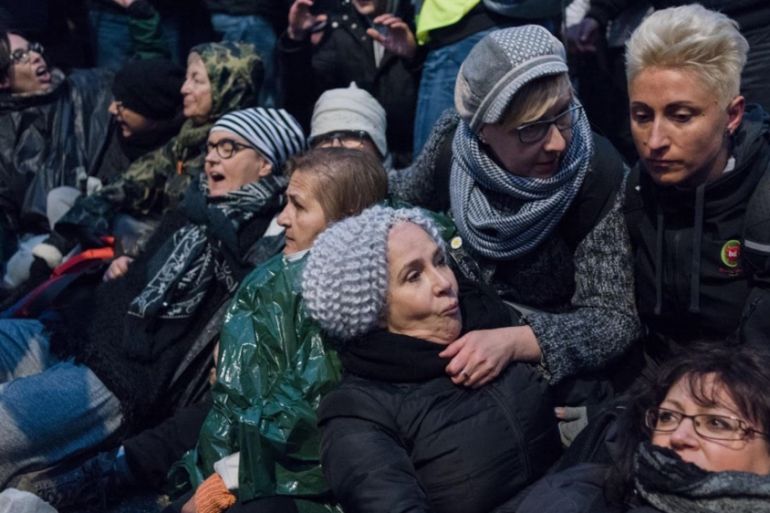Polish activists are under attack for standing up to hate
14 brave women who were beaten and prosecuted for protesting against Poland’s far right are still awaiting justice.

Just over a year ago, Elzbieta had gathered with a small group of women in central Warsaw with a large “Stop Fascism” banner. It was November 11, Independence Day, and tens of thousands of people were marching through the city, many wielding flares and proudly displaying racist and fascist banners.
The march – described by some journalists as “the biggest gathering of far-right activists in Europe in recent years” – might sound like an event best avoided, but not for Elzbieta.
Keep reading
list of 4 itemsGermany bans far-right Austrian nationalist Martin Sellner from entry
Australian efforts on Islamophobia flag despite Christchurch wake-up call
Norway court says mass killer Breivik’s prison isolation not ‘inhumane’
She and 12 other women joined the march, and once in the midst of it, they unfurled their seven-metre-long banner. Another woman from their group filmed the action.
The footage she captured shows what happened next: a violent assault, in broad daylight by more than a dozen participants in the march.
“They started tearing our clothes and I was kicked several times from behind,” Elzbieta tells me. “Somebody spat on me several times. They removed us by force. Since then I have a problem with my neck.”
Another woman, Agnieszka, describes how “[at] first, people around us were surprised by the banner. Then they started kicking us, calling us names and eventually shoved us from the route. We hadn’t wanted to block the march, we simply wanted to show them our message and leave.”
The women suffered injuries, bruises and cuts. One of them was knocked to the ground, lost consciousness and had to be examined by medics. There were no police in the vicinity to protect them.
More than a year later, the women are still awaiting justice.
In September, their attempt to get a legal remedy for the violence and abuse they suffered was blocked after the prosecutor dropped the investigation. She asserted that the attackers had not intended to seriously harm the women but were merely “expressing their displeasure” that they had joined the march. While she acknowledged that the assault and the insults qualified as criminal offences, the prosecutor concluded that there was no public interest in continuing the case and recommended the women to pursue private prosecution.
To add insult to injury, a few months after the attack, the women learned that the police had opened an investigation against 13 of them for “obstructing a lawful assembly”. Nine of them were subsequently charged and convicted, and now have to pay fines and legal costs of 500 zlotys ($127).
|
|
The case of these 14 women is sadly not unique. For more than two years now, peaceful protesters have been experiencing effects of restrictive legislation combined with heavy-handed policing, surveillance and harassment. The authorities often fail to protect peaceful protesters from harassment and violence by far-right or nationalist groups and the simple act of peaceful protest can result in police custody and lengthy court proceedings.
Apart from limiting people’s rights to freely and peacefully take to the street and express their opinions, the government has also taken measures to undermine the independence of the judicial institutions in Poland. Indeed, since 2016, parliament has adopted regressive legislation that allows the government to put pressure on courts and judges.
And yet, despite the escalating crackdown on peaceful protests, people like Elzbieta and the so-called “anti-fascist 14”, are continuing to take to the streets and courageously demonstrate against the abuse of their rights and the threat on the rule of law.
The women remain steadfast in their fight for a fair and just Poland, where people expressing their views through peaceful protest are protected from attacks, rather than punished.
Speaking to me last month in Warsaw, the women’s lawyer expressed his incredulity that not only are nationalists and fascists marching again in a city so blighted by these forces during the World War II, but that those who stood up to them have been detained and dragged through the courts.
“The harsh penalties against us, no doubt, intended to send a warning to others who want to challenge the rollback of human rights,” Kryska, one of the 14 tells me. “But this will not discourage or intimidate us. We are not only fighting for justice for ourselves but are also trying to expose the way in which protesters are targeted.”
The views expressed in this article are the author’s own and do not necessarily reflect Al Jazeera’s editorial stance.
